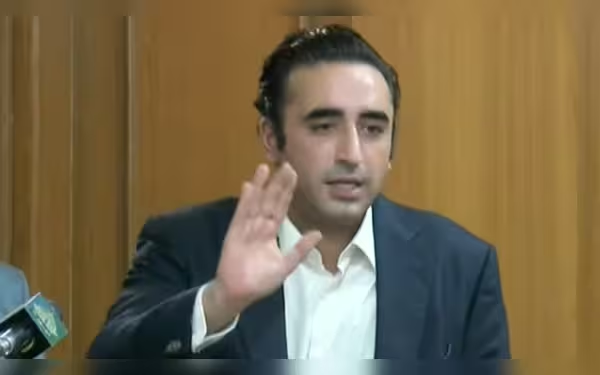Saturday, November 16, 2024 05:51 PM
PPP Backs Constitutional Court Proposal, Says Bilawal in Quetta
- PPP supports establishment of a federal constitutional court.
- Bilawal emphasizes need for judicial reform and accountability.
- Government faces hurdles in passing constitutional amendments.
 Image Credits: geo
Image Credits: geoBilawal Bhutto-Zardari announces PPP's support for a constitutional court amid ongoing judicial reform discussions in Pakistan.
In recent discussions surrounding the judicial landscape of Pakistan, the Pakistan Peoples Party (PPP) has taken a significant step by expressing its support for the establishment of a federal constitutional court. This proposal comes at a time when the country is grappling with various legal and political challenges, and the need for judicial reform has never been more pressing. The PPP Chairman, Bilawal Bhutto-Zardari, addressed the Balochistan High Court Bar in Quetta, shedding light on his party's stance regarding this crucial constitutional package.
Bilawal emphasized that the PPP has agreed to the government's proposal for the formation of a constitutional court, stating, "After the struggle of 30 years, we have decided to form a constitutional court." This statement reflects the party's long-standing commitment to judicial reform and the pursuit of justice for all citizens. He further clarified that his advocacy for this constitutional amendment is not tied to any specific individual, including the current Chief Justice, Qazi Faez Isa, who is set to retire soon.
During his address, Bilawal expressed his respect for Justice Mansoor Ali Shah and posed a thought-provoking question: would he accept the constitutional court if the constitution mandated it? This inquiry highlights the complexities surrounding judicial appointments and the broader implications of such reforms on the legal system.
Despite the government's efforts to push the constitutional package through Parliament, it has faced significant hurdles. The government is currently short of the necessary votes to pass the amendments, with 13 votes needed in the National Assembly and nine in the Senate. This situation raises concerns about the feasibility of implementing the proposed reforms and the potential impact on the judiciary's independence.
Bilawal articulated the necessity of constitutional amendments to ensure equality and justice in Pakistan, stating, "Nobody should be a sacred cow here." His remarks underscore the importance of accountability within the judicial system and the need for a fair and impartial legal framework. He also pointed out that the charter of democracy's first demand was the establishment of a federal constitutional court, emphasizing the historical significance of this initiative.
Moreover, Bilawal lamented the current state of the judiciary, where numerous cases remain unheard due to the emergence of new political cases every few months. He expressed a desire for a system that could secure justice for the people in the future, indicating that the proposed constitutional court is not merely a bureaucratic formality but a vital step towards a more just society.
The discussions surrounding the constitutional court reflect a broader dialogue about the need for judicial reform in Pakistan. As the PPP continues to advocate for these changes, it is essential for all stakeholders to engage in constructive dialogue to ensure that the legal system serves the interests of the people. The establishment of a constitutional court could pave the way for a more equitable and just society, where every citizen has access to fair legal representation and justice.













